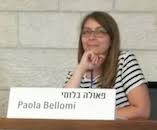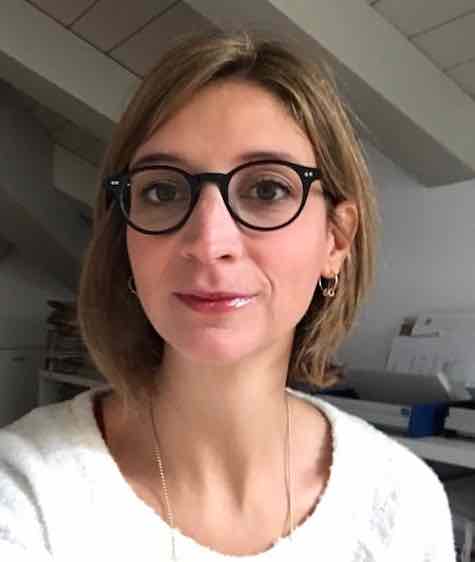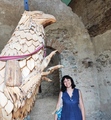Studying at the University of Verona
Here you can find information on the organisational aspects of the Programme, lecture timetables, learning activities and useful contact details for your time at the University, from enrolment to graduation.
Academic calendar
The academic calendar shows the deadlines and scheduled events that are relevant to students, teaching and technical-administrative staff of the University. Public holidays and University closures are also indicated. The academic year normally begins on 1 October each year and ends on 30 September of the following year.
Course calendar
The Academic Calendar sets out the degree programme lecture and exam timetables, as well as the relevant university closure dates..
| Period | From | To |
|---|---|---|
| FULL YEAR | Oct 2, 2017 | Jun 9, 2018 |
| Semester 1 | Oct 2, 2017 | Jan 20, 2018 |
| Semester 2 | Feb 26, 2018 | Jun 9, 2018 |
| Session | From | To |
|---|---|---|
| Winter session | Jan 22, 2018 | Feb 24, 2018 |
| Summer session | Jun 11, 2018 | Jul 28, 2018 |
| Autumn session | Aug 27, 2018 | Sep 22, 2018 |
| Session | From | To |
|---|---|---|
| LAUREE LINGUE - sessione autunnale a.a. 2016/2017 | Dec 18, 2017 | Dec 21, 2017 |
| LAUREE LINGUE - sessione invernale a.a. 2016/2017 | Mar 23, 2018 | Mar 29, 2018 |
| LAUREE LINGUE - sessione estiva | Jul 16, 2018 | Jul 21, 2018 |
| LAUREE LINGUE - sessione autunnale | Nov 12, 2018 | Nov 17, 2018 |
| LAUREE LINGUE - sessione invernale | Apr 12, 2019 | Apr 18, 2019 |
| Period | From | To |
|---|---|---|
| Immaculate Conception | Dec 8, 2017 | Dec 8, 2017 |
| Christmas break | Dec 22, 2017 | Jan 7, 2018 |
| Easter break | Mar 30, 2018 | Apr 3, 2018 |
| Liberation Day | Apr 25, 2018 | Apr 25, 2018 |
| Labour Day | May 1, 2018 | May 1, 2018 |
| Patron Saint Day | May 21, 2018 | May 21, 2018 |
| Republic Day | Jun 2, 2018 | Jun 2, 2018 |
| Summer break | Aug 13, 2018 | Aug 18, 2018 |
| Description | Period | From | To |
|---|---|---|---|
| ANNUALE | ANNUALE | Oct 2, 2017 | Jun 9, 2018 |
Exam calendar
Exam dates and rounds are managed by the relevant Foreign Languages and Literatures Teaching and Student Services Unit.
To view all the exam sessions available, please use the Exam dashboard on ESSE3.
If you forgot your login details or have problems logging in, please contact the relevant IT HelpDesk, or check the login details recovery web page.
Should you have any doubts or questions, please check the Enrollment FAQs
Academic staff
 valentina.adami@univr.it
valentina.adami@univr.it
 paola.bellomi@univr.it
paola.bellomi@univr.it
 daniele.beltrame@univr.it
daniele.beltrame@univr.it
 paolamaria.caleffi@univr.it
paolamaria.caleffi@univr.it
 riccardo.cella@univr.it
riccardo.cella@univr.it
 elisa.dallarosa@univr.it
elisa.dallarosa@univr.it
 sara.dattoma@univr.it
sara.dattoma@univr.it
 mariangela.lando@univr.it - marilando771@gmail.com
mariangela.lando@univr.it - marilando771@gmail.com
 stefania.montemezzo@univr.it
stefania.montemezzo@univr.it
 chunye.niu@univr.it
chunye.niu@univr.it
 alessia.polatti@univr.it
alessia.polatti@univr.it
 dora.renna@univr.it
dora.renna@univr.it
 fabioantonio.scrignoli@univr.it
fabioantonio.scrignoli@univr.it
 tania.triberio@univr.it
tania.triberio@univr.it
 sonia.trovato@univr.it
sonia.trovato@univr.it
Study Plan
The Study Plan includes all modules, teaching and learning activities that each student will need to undertake during their time at the University.
Please select your Study Plan based on your enrollment year.
1° Year
| Modules | Credits | TAF | SSD |
|---|
German literature and culture 1
German literature and culture 1
2° Year activated in the A.Y. 2018/2019
| Modules | Credits | TAF | SSD |
|---|
English literature and culture 2
German literature and culture 2
Spanish literature and culture 2
English literature and culture 2
German literature and culture 2
Spanish literature and culture 2
Geography of communication and international trade
Italian literature and culture
Modern and Contemporary Economic History
Theory and Techniques of communication
3° Year activated in the A.Y. 2019/2020
| Modules | Credits | TAF | SSD |
|---|
Comparative and European Public law
Principles of international marketing
| Modules | Credits | TAF | SSD |
|---|
German literature and culture 1
German literature and culture 1
| Modules | Credits | TAF | SSD |
|---|
English literature and culture 2
German literature and culture 2
Spanish literature and culture 2
English literature and culture 2
German literature and culture 2
Spanish literature and culture 2
Geography of communication and international trade
Italian literature and culture
Modern and Contemporary Economic History
Theory and Techniques of communication
| Modules | Credits | TAF | SSD |
|---|
Comparative and European Public law
Principles of international marketing
| Modules | Credits | TAF | SSD |
|---|
Legend | Type of training activity (TTA)
TAF (Type of Educational Activity) All courses and activities are classified into different types of educational activities, indicated by a letter.
Chinese language 2 (2018/2019)
Teaching code
4S003689
Credits
9
Language
Italian
Scientific Disciplinary Sector (SSD)
L-OR/21 - CHINESE AND SOUTH ASIAN LANGUAGES AND LITERATURES
The teaching is organized as follows:
Lezioni
Esercitazioni linguistiche
Learning outcomes
At the end of the course students should demonstrate that they possess a practical knowledge of modern Chinese grammar and lexicon, enough for them to communicate independently on simple topics. Their knowledge of Chinese lexicon and grammar will be enhanced, as well as basic communicative skills, in particular listening, reading, written and oral production. Moreover, another aim of the course is to let students acquire an active and passive knowledge of a wider lexicon, with particular attention to specific terms from the domains of trade, business and tourism. At the end of the course, students will reach a level of linguistic knowledge and a vocabulary required for an HSK3 certificate, corresponding to the B1 level in the international language standards.
Attendance is mandatory.
Program
In-depth study of Mandarin Chinese syntax and lexicon. Sentence types, particles, adverbs, conjunctions, prepositions, verbal complements, coordinate and subordinate clauses. Specific focus especially on syntax of coordinate and subordinate clauses, and of specific structures of the Chinese sentence. Development of communicative functions, widening of the vocabulary, improvement of listening, reading, writing skills, as well as that of oral production. Exercises on grammar, communicative functions and vocabulary.
Teaching methods include frontal lessons with active participation of the students, through structures and rules used in examples of the language in use, exercises and analyses of proposed texts.
Grammar lectures (prof. Beltrame) will use frontal teaching methods with Power Point files, textbooks, and additional materials provided and explained by the teacher. Active participation of the students will be ensured through exercises during the lessons. Applied language activities (prof. Sun) will be provided in an interactive manner, including reading, listening exercises, writing and conversations.
Course texts:
- Teng, Wen-hua (2011). “Yufa! A Practical Guide to Mandarin Chinese Grammar”. London: Hodder Education.
-Abbiati, Magda; Zheng Ruifang (2011). “Dialogare in cinese. Corso di lingua colloquiale, vol. I”. Venezia: Cafoscarina.
-Abbiati, Magda; Zheng Ruifang (2011). “Dialogare in cinese. Corso di lingua colloquiale, vol. II”. Venezia: Cafoscarina.
Additional teaching materials will be used by the teacher during the lessons and uploaded on the e-learning page of the course after each lesson.
Recommended texts:
- Abbiati, Magda (2011) “Grammatica di cinese moderno”. Venezia: Cafoscarina.
- Romagnoli, Chiara (2012). “Grammatica cinese”. Milano: Hoepli.
- Cui Songren (2004). “Business Chinese. An Advanced Reader”. Hong Kong: The Chinese University Press.
Recommended Chinese-Italian/Italian-Chinese dictionaries:
- Casacchia, Giorgio; Bai Yukun (2013). “Dizionario Cinese-Italiano”. Venezia: Cafoscarina. [solo cinese-italiano]
- Zhao Xiuying (a cura di) (2013). “Il dizionario di cinese”. Bologna: Zanichelli.
- Zhang Shihua (a cura di) (2007). “Dizionario di cinese”. Milano: Hoepli.
Recommended Chinese-English dictionaries:
- Lin Yuan (ed.) (2002). “The Contemporary Chinese Dictionary”. Beijing: Foreign Language Teaching and Research Press.
- Hui Yu (ed.) (2004). “A New Century Chinese-English Dictionary”. Beijing: Foreign Language Teaching and Research Press.
Bibliography
| Activity | Author | Title | Publishing house | Year | ISBN | Notes |
|---|---|---|---|---|---|---|
| Lezioni | Magda Abbiati, Zhang Ruoying | Dialogare in cinese 1. Corso di lingua colloquiale | Libreria Editrice Cafoscarina | 2010 | 978-88-7543-275-1 | |
| Lezioni | Magda Abbiati; Zheng Ruifang | Dialogare in cinese 2. Corso di lingua colloquiale | Libreria Editrice Cafoscarina | 2011 | 978-88-7543-300-0 | |
| Lezioni | Teng Wen-hua | Yufa! A Practical Guide to Mandarin Chinese Grammar | Hodder Education | 2011 | 9781444109139 | |
| Esercitazioni linguistiche | Magda Abbiati, Zhang Ruoying | Dialogare in cinese 1. Corso di lingua colloquiale | Libreria Editrice Cafoscarina | 2010 | 978-88-7543-275-1 | |
| Esercitazioni linguistiche | Magda Abbiati; Zheng Ruifang | Dialogare in cinese 2. Corso di lingua colloquiale | Libreria Editrice Cafoscarina | 2011 | 978-88-7543-300-0 |
Examination Methods
The final exam consists of three parts: a written test on grammar, composition and reading comprehension, a listening test extracted from HSK 3 tests and a conversation test in Chinese. Each part of the exam has a ten-point worth. Students must obtain at least 6 points in each part in order to pass the exam. All parts of the exam must be passed in the same date: whoever wants or needs to repeat the exam must repeat all three parts (written test, listening and conversation). The final score will be expressed in points out of 30.
HSK certificates will not be accepted as substitute for the exam, nor any of its part.
Details about the exam will be published on the e-learning page during the course.
At the end of the first semester, i.e. in the winter session of January-February 2019, a midterm examination (score not registered) will be held based on the first half of the programme. The modality of the midterm exam is the same as that of the final exam, as described above. Also in the case of midterm exam, it is composted of three parts, students must obtain the passing mark (6 points out of 10) in each part in order to pass the exam.
Students who pass the midterm examination will need to prepare the second half of the programme for the final exam and the final mark will be the average of the two exams. Those who don't pass the midterm exam must prepare the entire programme for the final exam. Students who wish to decline the mark of midterm exam should express such intention clearly writing from their university email address to the teacher’s university email address, within one week after the publishing date of exam results seen on e-learning webpage of the course.
The score of the midterm examination is valid for a year, until the second exam session in January-February 2020. After the final exam, students who had already passed the midterm examination previously can choose to repeat the second part of the exam (relative to the programme of the second semester) or the entire syllabus (programme of the first and the second semester), losing the mark of the midterm examination. In both cases, in the email sent to the teacher, students should state clearly whether he/she wish to decline the mark of the second part of the exam only or both marks of the mid-term exam and the second part of the exam.
Since attendance is mandatory, students who don’t reach 60% of the attendance will not be admitted to the exam. Those having between 60% and 75% of the attendance must pass an additional oral test on the grammatical topics covered during the course. In order to justify non-attendance, certificates proving real and well-grounded reasons (health, study, mandatory internships or possession of HSK certificates from level 3 to level 6) will be considered. These certificates must be submitted to the teacher before the exam.
Type D and Type F activities
To discover all the teaching activities accredited by the foreign teaching college click here
Career prospects
Module/Programme news
News for students
There you will find information, resources and services useful during your time at the University (Student’s exam record, your study plan on ESSE3, Distance Learning courses, university email account, office forms, administrative procedures, etc.). You can log into MyUnivr with your GIA login details: only in this way will you be able to receive notification of all the notices from your teachers and your secretariat via email and soon also via the Univr app.
Student login and resources
Gestione carriere
Assegnazione tutore
Attività accreditate D/F
Calendario didattico dettagliato
Cambio lingua curriculare
Competenze informatiche
Competenze linguistiche (prima e seconda lingua)
Competenze linguistiche in triennale (terza lingua CFU F)
Compilazione del piano didattico
Corso di Lingua portoghese
Erasmus+ e altre esperienze all'estero
Linguistic training CLA
Presentazione dei corsi di studio e Open day
Graduation
List of theses and work experience proposals
| Stage | Research area |
|---|---|
| PROGETTO MAMBRINO Stage per bibliografia | Various topics |
Saperi minimi
Stage e tirocini
Nel piano didattico della laurea triennale in Lingue per il turismo e il commercio internazionale (L12) è previsto un periodo di stage obbligatorio (CFU 6) in organizzazioni imprenditoriali.
Le attività di stage sono finalizzate a far acquisire allo studente una conoscenza diretta in settori di particolare interesse per l’inserimento nel mondo del lavoro e per l’acquisizione di abilità professionali specifiche.
Le attività di stage sono svolte sotto la diretta responsabilità di un singolo docente presso studi professionali, enti della pubblica amministrazione, aziende accreditate dall’Ateneo veronese.
I crediti maturati in seguito ad attività di stage saranno attribuiti secondo quanto disposto nel dettaglio dal “Regolamento d’Ateneo per il riconoscimento dei crediti maturati negli stage universitari” vigente.
- Tutte le informazioni in merito agli stage per futuri studenti sono disponibili alla pagina Stage e tirocini.
- Tutte le informazioni in merito agli stage per studenti iscritti sono pubblicate in MyUnivr - come fare per - stage e tirocini.
- Tutte le informazioni in merito agli stage per le aziende sono disponili alla pagina Stage e tirocini per azienze.
Ulteriori informazioni al seguente link https://www.univr.it/it/i-nostri-servizi/gestione-carriere-studenti-lingue-e-letterature-straniere/stage-e-tirocini-lingue-e-letterature-straniere


 +39 045802 8409
+39 045802 8409

























































